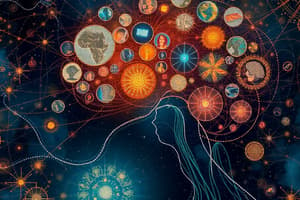Podcast
Questions and Answers
What is the primary function of sensory memory?
What is the primary function of sensory memory?
- To transform information into neural connections
- To hold information for a short period before further processing (correct)
- To store information for an unlimited time period
- To preserve facts and events
What is the main focus of the encoding stage in memory processes?
What is the main focus of the encoding stage in memory processes?
- Preserving encoded information over time
- Creating neural connections within the brain
- Transforming information into a storable form (correct)
- Recalling stored information
Which type of memory involves holding information for less than 20 seconds?
Which type of memory involves holding information for less than 20 seconds?
- Short-Term Memory (correct)
- Procedural Memory
- Long-Term Memory
- Sensory Memory
Which factor can influence the quality and durability of memory?
Which factor can influence the quality and durability of memory?
Which type of memory involves skills and habits?
Which type of memory involves skills and habits?
Which memory improvement technique involves spreading study sessions over time and at increasing intervals?
Which memory improvement technique involves spreading study sessions over time and at increasing intervals?
What is a characteristic of Alzheimer's Disease?
What is a characteristic of Alzheimer's Disease?
How does chronic stress impact memory?
How does chronic stress impact memory?
Which factor can help slow the decline in memory performance associated with aging?
Which factor can help slow the decline in memory performance associated with aging?
What is a common symptom of Dementia?
What is a common symptom of Dementia?
Flashcards are hidden until you start studying
Study Notes
Human Memory: A Comprehensive Exploration
Human memory, a fascinating facet of our cognitive abilities, refers to the process through which information is encoded, stored, and retrieved over time. This article delves into the types of memory, memory processes, factors influencing memory, memory disorders, and techniques to improve memory.
Types of Memory
Memory can be categorized into three primary types:
- Sensory Memory: The initial stage of memory, where sensory information from sight or sound is momentarily stored before being processed further.
- Short-Term Memory: A limited capacity and temporary storage system that holds information for a short period, typically less than 20 seconds.
- Long-Term Memory: The extensive and relatively permanent storage of information with no time limit. Long-term memory can be further subdivided into declarative memory (facts and events) and procedural memory (skills and habits).
Memory Processes
Memory processes encompass encoding, storage, and retrieval mechanisms.
- Encoding: The initial stage of memory formation, where information is transformed into a representation that can be stored.
- Storage: The preservation of encoded information over time. Information is stored in the form of neural connections within the brain.
- Retrieval: The process of recalling information stored in memory.
Factors Influencing Memory
Various factors can influence the quality and durability of memory.
- Attention: The ability to concentrate on relevant information and ignore irrelevant stimuli.
- Emotional State: Strong emotions can either enhance or impair memory recall.
- Practice and Repetition: The more often information is rehearsed, the more likely it is to be retained in long-term memory.
- Age: Memory performance can decline with age, but maintaining an active lifestyle and engaging in cognitive activities can slow this decline.
- Sleep: Sleep is essential for memory consolidation and retrieval.
- Stress: Chronic stress can impair memory, while short-term stress can enhance memory performance.
- Alcohol and Drug Use: Alcohol and other drugs can impair memory by disrupting neural functioning.
Memory Disorders
Memory disorders can result from various causes, including normal aging, medical conditions, and neurological disorders.
- Alzheimer's Disease: A progressive neurological disorder that results in memory loss, cognitive decline, and behavioral changes.
- Dementia: A group of symptoms affecting memory, thinking, and social abilities severely enough to interfere with daily activities.
- Amyotrophic Lateral Sclerosis (ALS): A progressive neurodegenerative disease that affects motor neurons and leads to muscle weakness, difficulty speaking, and memory issues.
Improving Memory
Memory improvement techniques can be applied to enhance learning and recall.
- Spaced Repetition: Spreading study sessions over time and at increasing intervals enhances memory retention.
- Active Recall: Actively retrieving information from memory rather than passively rereading text.
- Imagery and Visualization: Creating vivid mental images of information can aid in learning and recall.
- Mnemonics: Memory techniques such as acronyms, rhymes, and visual imagery can help encode and recall complex information.
- Mindfulness and Relaxation: Reducing stress and practicing mindfulness can improve memory performance.
- Sleep: Adequate quality and duration of sleep are essential for memory consolidation and retrieval.
By understanding the different aspects of human memory and their underlying mechanisms, you can make informed decisions to support memory performance and maintain optimal cognitive functioning.
Studying That Suits You
Use AI to generate personalized quizzes and flashcards to suit your learning preferences.




